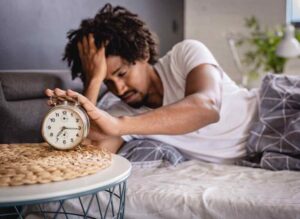How Light Disturbs Your Rhythm
Light, even more specifically blue light, confuses your mind and can create restless nights. You might be thinking: What is blue light and how can I prevent it?
Well let me explain from the top: blue light is short wavelength light. Examples of this can be the sun all the way to artificial light such as your average screen. (Random Fun Fact: Blue Light scatters easily because of its short wavelength which is why the sky is blue!) When you are on your phone scrolling at night, you disorient your brain into thinking it’s still day and melatonin production decreases. Melatonin is a hormone that your body produces to regulate sleep with the goal to signal to your body it’s time to sleep. So if you are on your phone all night and you decide to get to some slumber, it might be difficult because essentially you were telling you’re body it’s day and you suddenly tell it it’s night. Melatonin production is not instant, so help your body out and try to avoid electronics an hour before bed.
The Power of Schedules
Schedules have more uses than just telling you what class to go to; an example is how they also aid your body’s circadian rhythm.
To put it simply, circadian rhythm is your body’s internal clock that tells you when to sleep/wake up. It is reliant on hormones like melatonin that tell your body it’s time for bed. Picture this: all week you wake up and fall asleep at different times, while this is happening your circadian rhythm is thrown off because it doesn’t known what is the proper time for rest. This creates a difficult time for you when to try to sleep because the proper amount of melatonin wasn’t produced. A great way to prevent this, is to be consistent and fall asleep/rise from bed at relatively the same time. This helps your body naturally fall into the same pattern and makes not only falling asleep easier but waking up easier.
Homework and Scrolling Disrupt Your Sleep

Have you ever worked on homework or spend hours doomscrolling or doing useless stuff on your phone while getting comfortable your bed? I’ll take a guess that you do at least one of these things. Now here is the harsh truth: You shouldn’t be doing either of them. When you spend time on your phone or homework on your bed, you’re telling your brain to be alert and ready. As you continue to do this, your brain associates your bed with alertness and readiness. This ultimately makes it harder to sleep because when you try to sleep, your mind is used to being sharp and responsive, and sleeping while being alert is very challenging. So do yourself a favor and do homework at a place outside your bed. And for doomscrolling, you really shouldn’t be doing it anyway but if you must, do it outside your bed.
Naps: Enemies or Friends?
Naps can be beneficial or harmful depending on time of day and length. Let me explain the best scenario to nap in and how certain factors play into a good nap. The ideal time for a siesta is a little after lunch time so around 1 PM. Your body takes a natural dip in energy levels around this time so a little nap could be helpful. But keep in mind the later you take a nap the harder it will be to fall asleep at night. Another factor is the duration of your sleep. The perfect time for a nap is 20-30 min. The reason for this is to avoid grogginess and to avoid entering a deeper level of sleep which you would typically do at night. Anything longer will severely impact how easy it is to sleep at night. With the Jesuit schedule it is probably better to avoid naps on the week days but if it’s needed weekends can be acceptable. Remember to keep in mind that a nap is supposed to aid sleep not replace it.
Strategy for Effortless Sleep
To be able to rest at night with no challenges several things must be achieved. One of the most important things is to properly relax and to slowly tell your body that bed time is approaching. A great way to achieve this is through the 10-3-2-1-0 Rule. A rule designed to have you wind down gradually over time.
What the numbers stand for:

10 – hours before time of sleep, stop consuming caffeine.
The simple reasoning for this is that caffeine keeps you awake, but why? Caffeine blocks an important hormone used to slow nerve activity; no it’s not melatonin but adenosine. Caffeine not only blocks the effects of adenosine but enhances the opposite by increasing nerve activity. So, caffeine will leave you stimulated and alert which are feelings that will keep you up not fall asleep.
3 – hours before bed, stop eating.
This tip benefits you more on food/health realm than sleep but nonetheless can affect both. First off, eating right before bed consistently can turn into weight gain and worse digestion because your body burns fewer calories while sleeping than awake. Not to mention, eating to close to bed can cause health problems such as acid reflux. It can also cause discomfort while sleeping because of the trapped food that you didn’t give enough time to be digested.
2 – hours before bed, relax and avoid mentally taxing tasks.
Mentally taxing activities like difficult homework can make sleeping so much more difficult if it’s done right before bed. This type of work makes your brain focused and alert, like caffeine your nerve activity will increase leaving a tough time for sleep. Another reason aside from alertness, is that having a lot of work can easily cause high levels of the stress hormone cortisol. Having lots of cortisol will make it difficult to be in a relaxing state. And when’s the last time you remember falling asleep effortlessly while being stressed?
1 – hour before bed, put away all electronics and avoid blue light.
You’ve already learned how blue light affects your circadian rhythm. It’s recommended that you should “unplug” about an hour before bed so your body can produce enough melatonin for a great night of rest.
0 – times you should hit the snooze button.
This type doesn’t directly impact effortless sleep but it certainly has an impact on people in the morning. Here’s why hitting that snooze button causes that: Pressing snooze on your alarm will cause sleep inertia. And Newton’s first law of sleep inertia says the unbalanced force (alarm) should wake you up or you’ll experience an affected mood, memory, and cognitive performance because you hit snooze. Also when you hit snooze your body is left confused because it doesn’t know whether to continue resting or wake up. Ultimately, you will feel not fully rested, and not fully woken up in the end, so don’t press snooze!!!
Training your Brain for Sleep
There are many ways to tell your brain that the time of night has come. Several ways to do that have already been stated in this article but another great way to accomplish a great night of rest is through a relaxation routine. If you haven’t already found out, sleeping is much easier while at ease. Relaxation exercises properly ease your brain into a sleeping state. Examples of this include: light reading, stretching, listening to soothing music, controlled breathing, meditation, prayer, a bath, journaling, etc.

The true purpose for relaxation routines is to practice consistently because then your brain naturally understands the time for sleep is approaching. Not only that but relaxation techniques have been found to improve sleep quality. Of course, there are many ways to relax yourself, but what’s most important is to choose one or a few that work for you.
Electronics and Beds don’t mix
I previously stated that blue light disturbs your sleep and that scrolling on your phone on your bed isn’t good for you. That ties to the main idea that electronics and beds don’t mix! Having your phone on your bed while sleeping might give you the temptation to spend useless time on it. Another reason to keep that phone out of your bed is to wake effectively.

Copyright: @ Smiljana Aleksic
What I mean by that is if you keep your phone/alarm out of your bed, you force yourself to get out of your bed. When that happens, you are less likely to fall right back into your bed because you’re already out of it. That is a much more effective way to wake up compared to having your phone next to you and waking up. Because when you do that, you’re just fighting with that part of you that wants more sleep. From personal experience, I’m way more likely to just hit stop and stay in bed. Trust me, in every way: beds and electronics don’t mix!
How to get Sleep right the 2nd time
Don’t you just hate it when you can’t sleep for some reason and no matter how hard you try you just can’t? Here’s a great way to properly fall asleep without making it harder for yourself. Like I mentioned earlier: keep your electronics out your bed! By doing this you avoid the temptation to stare at blue light for hours so you keep your brain relaxed. If you can’t sleep you probably have a lot on your mind or you violated one of my tips. Either way, the best thing to do is to relax your brain. You should do this by doing something relaxing in the dark (to avoid blue light focus). You should exercise something relaxing like one of the relaxation techniques but avoid doing something stimulating. The whole point is to fall asleep and if you are stimulating your brain, you are doing the exact opposite.
How to make your room a Sleeping Haven

The way to make your room a sleeping paradise requires several things to take place. If you didn’t feel like trying to do any of the tips that I have stated then at least try this one. People have different preferences when it comes to sleeping environment but there are several things you change to your sleeping environment to make sleep easier. The first thing to do is to have a comfortable bed and mattress. That’s just a given. But the next thing is to clear out noise. For most people, like myself, sleep is better when I don’t hear anything. But then again some people like a fan or white noise, it’s all about preference. Next is room temperature. The ideal temperature is 65-68 degrees Fahrenheit. While you’re trying to sleep, you don’t want to focus on being uncomfortable because of the heat of cold, so 65-68 hits right at the sweet spot. This goes back to the very first tip on how light impacts your rhythm. The perfect lightning in your room is to be dark and dim. Without any light and don’t you even think on turning on that phone.
I imagine the average high school student is impacted by sleep someway, somehow. It’s difficult finding the time to sleep yet alone difficult having a good night of sleep. I feel that in an high school environment sleep is just a side thing you end up doing, without focusing too much or at all for that matter. Throughout all this research the evidence just shows sleep is significant in our lives and should be taken seriously. I hope as the reader you take these tips for the better.
Check out The Roundup for more student advice!
